Related Research Articles
Until roughly 2,000 years ago, what would become Zimbabwe was populated by ancestors of the San people. Bantu inhabitants of the region arrived and developed ceramic production in the area. A series of trading empires emerged, including the Kingdom of Mapungubwe and Kingdom of Zimbabwe. In the 1880s, the British South Africa Company began its activities in the region, leading to the colonial era in Southern Rhodesia.
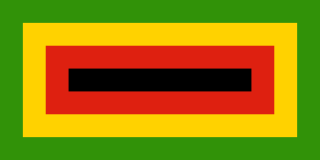
The Zimbabwe African National Union – Patriotic Front (ZANU–PF) is a political organisation which has been the ruling party of Zimbabwe since independence in 1980. The party was led for many years by Robert Mugabe, first as prime minister with the Zimbabwe African National Union (ZANU) and then as president from 1987 after the merger with the Zimbabwe African People's Union (ZAPU) and retaining the name ZANU–PF, until 2017, when he was removed as leader.
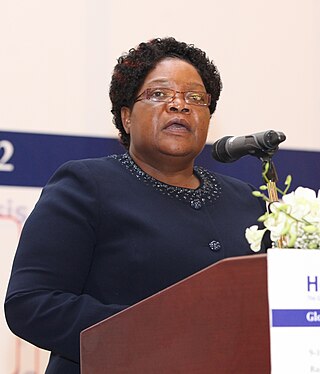
Joice Runaida Mujuru, also known by her nom-de-guerre Teurai Ropa Nhongo, is a Zimbabwean revolutionary and politician who served as Vice-President of Zimbabwe from 2004 to 2014. Previously she had served as a government minister. She also served as Vice-President of ZANU–PF. She was married to Solomon Mujuru until his death in 2011 and was long considered a potential successor to President Robert Mugabe, but in 2014 she was denounced for allegedly plotting against Mugabe. As a result of the accusations against her, Mujuru lost both her post as Vice-President and her position in the party leadership. She was expelled from the party a few months later, after which she formed the new Zimbabwe People First party.

Edgar Zivanai Tekere, nicknamed "2 Boy", was a Zimbabwean politician. He was the second and last Secretary General of the Zimbabwe African National Union (ZANU) who organised the party during the Lancaster House talks and served in government before his popularity as a potential rival to Robert Mugabe caused their estrangement.
The Central Intelligence Organisation (CIO) is the national intelligence agency of Zimbabwe. It was conceived as the external intelligence-gathering arm of the British South Africa Police Special Branch in the early 1960s, under the Southern Rhodesian Prime Minister Winston Field, and later served as one of the secret police organizations for President Robert Mugabe's regime.

The Zimbabwe National Army (ZNA) is the primary branch of the Zimbabwe Defence Forces responsible for land-oriented military operations. It is the largest service branch under the Zimbabwean Joint Operations Command (JOC). The modern army has its roots in the Rhodesian Army, which was raised between 1963 and 1964 after the breakup of the Federation of Rhodesia and Nyasaland. A Joint High Command created in March 1980 to oversee integration of the formerly belligerent Rhodesian Security Forces, Zimbabwe African National Liberation Army (ZANLA), and the Zimbabwe People's Revolutionary Army (ZIPRA) officially established the Zimbabwe National Army in late 1980, nearly a year after the end of the Rhodesian Bush War.
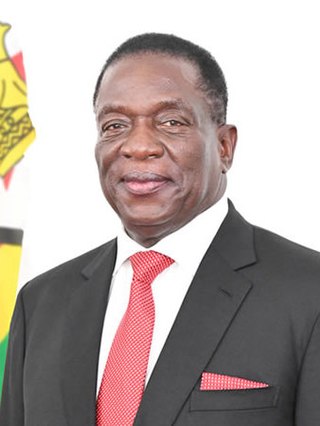
Emmerson Dambudzo Mnangagwa is a Zimbabwean politician who is serving as the third president of Zimbabwe since 2017. A member of ZANU–PF and a longtime ally of former President Robert Mugabe, he held a series of cabinet portfolios and he was Mugabe's first-vice president from 2014 until 2017, when he was dismissed before coming to power in a coup d'état. He secured his first full term as president in the disputed 2018 general election. Mnangagwa was re-elected in the August 2023 general election with 52.6% of the vote.

There were widespread reports of systematic and escalating violations of human rights in Zimbabwe under the regime of Robert Mugabe and his party, ZANU-PF, between 1980 and 2017.
The Zimbabwean government claimed to have foiled a coup d'état attempt involving almost 400 soldiers and high-ranking members of the military that would have occurred on June 2 or June 15, 2007. The alleged leaders of the coup, all of whom were arrested, were retired army Captain Albert Matapo, Colonel Ben Ncube, Major General Engelbert Rugeje, and Air Vice Marshal Elson Moyo.
Campaigning for the first round of the presidential election held in Zimbabwe on 29 March 2008 took place from February to March. There were three major candidates: President Robert Mugabe of the ruling Zimbabwe African National Union - Patriotic Front (ZANU-PF), Morgan Tsvangirai of the opposition Movement for Democratic Change, and the independent candidate Simba Makoni.

Robert Gabriel Mugabe was a Zimbabwean revolutionary and politician who served as Prime Minister of Zimbabwe from 1980 to 1987 and then as President from 1987 to 2017. He served as Leader of the Zimbabwe African National Union (ZANU) from 1975 to 1980 and led its successor political party, the ZANU – Patriotic Front (ZANU–PF), from 1980 to 2017. Ideologically an African nationalist, during the 1970s and 1980s he identified as a Marxist–Leninist, and as a socialist during the 1990s and the remainder of his career.
The second round of voting in the Zimbabwean presidential election of 2008 was held between Robert Mugabe and Morgan Tsvangirai after the first round failed to produce a 50% majority for either candidate. The election process was marred by violence against and intimidation of voters and party workers, which eventually led to the withdrawal of Tsvangirai from the poll. This left Mugabe as the winner of, effectively, a one-candidate election.

The 7th Parliament of Zimbabwe was a meeting of the Zimbabwean Parliament, composed of the Senate and the House of Assembly. It met in Harare over five sessions from 25 August 2008 to 27 June 2013. Its membership was set by the disputed 2008 Zimbabwean general election, which resulted in a ZANU–PF majority in the Senate and Movement for Democratic Change – Tsvangirai control of the House of Assembly. Political negotiations resulted in the 2009 Government of National Unity, a coalition government composed of ZANU–PF, the MDC–T, and the MDC–M.
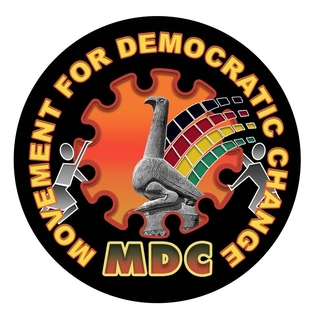
The Movement for Democratic Change – Tsvangirai (MDC–T) is a centre-left political party and was the main opposition party in the House of Assembly of Zimbabwe ahead of the 2018 elections. After the split of the original Movement for Democratic Change in 2005, the MDC–T remained the major opposition faction, while a smaller faction, the Movement for Democratic Change – Ncube, or MDC–N, was led by Welshman Ncube.

Morgan Richard Tsvangirai was a Zimbabwean politician who was Prime Minister of Zimbabwe from 2009 to 2013. He was president of the Movement for Democratic Change, and later the Movement for Democratic Change – Tsvangirai (MDC–T), and a key figure in the opposition to former president Robert Mugabe.
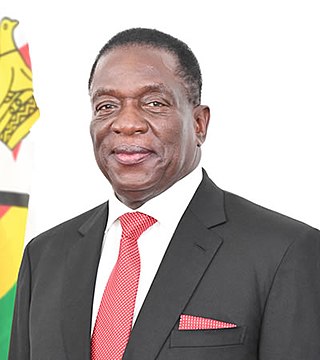
The president of Zimbabwe is the head of state of Zimbabwe and head of the executive branch of the government of Zimbabwe. The president chairs the national cabinet and is the chief commanding authority of the Zimbabwe Defence Forces. The incumbent president is Emmerson Mnangagwa, installed on 24 November 2017 after his predecessor, Robert Mugabe resigned in the aftermath of a 2017 coup d'état.

General elections were held in Zimbabwe on 29 March 2008 to elect the President and Parliament. Because of Zimbabwe's dire economic situation, the elections were expected to provide incumbent President Robert Mugabe with his toughest electoral challenge to date. Mugabe's opponents were critical of the handling of the electoral process, and the government was accused of planning to rig the election. Human Rights Watch said that the election was likely to be "deeply flawed." The elections were characterized by violence.
The Commander of the Zimbabwe Defence Forces is Chief of the Zimbabwe Defence Forces and the national defence organisations.

On 23 June 2018, a grenade exploded at White City Stadium in Bulawayo, Zimbabwe. The blast occurred at a ZANU–PF campaign rally, just after President Emmerson Mnangagwa had finished giving a speech. It was described as an assassination attempt against Mnangagwa, who was unharmed. The bombing resulted in at least 49 injured, including Vice-Presidents Constantino Chiwenga and Kembo Mohadi, and other high-ranking government officials. Two security agents later died of their injuries.
Tandabantu Godwin Matanga is a Zimbabwean police officer who serves as the current commissioner-general of the Zimbabwe Republic Police since 19 December 2017. He took office after the removal of Augustine Chihuri following the November 2017 coup d'état, and was officially appointed as commissioner-general on 12 February 2018 by President Emmerson Mnangagwa. He joined the police in 1982 and previously had been deputy commissioner-general since 1992.
References
- ↑ Martin, D. and Johnson, P. 1981. The struggle for Zimbabwe. Boston, Faber and Faber.
- ↑ N. Bhebe and T. Ranger (eds), 1995. Soldiers in Zimbabwe's Liberation War. Volume One. James Currey, London.
- ↑ Smith Takes a Dangerous New Gamble, Time, 13 June 1977.
- ↑ IV. Background, "Bullets for Each of You": State-Sponsored Violence since Zimbabwe’s 29 March Elections. Human Rights Watch. June 2008. ISBN 1-56432-324-2
- ↑ "Mugabe's hatchet men". Independent Online, 29 June 2008.
- ↑ "'Military coup' in Zimbabwe as Mugabe is forced to cede power to generals". The Times, 9 June 2008.
- ↑ "Zimbabwe: UN resolution targets Robert Mugabe's 'criminal cabal'". The Telegraph, 9 July 2008.
- ↑ "Zim general calls prime minister a security risk". Independent Online (IOL). South Africa. 24 June 2011. Archived from the original on 13 February 2021.
